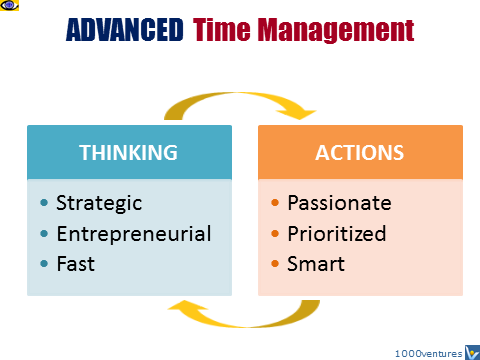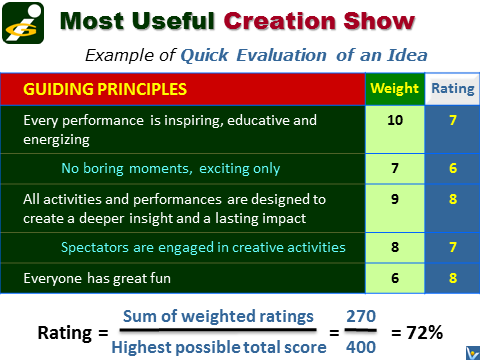| |
Strategic choices refer to the
decisions made by individuals or
organizations about how to
allocate their resources in
order to achieve their long-term
stretch goals.
These choices are interrelated
and should align with both
internal capabilities and
external conditions, as they aim
to be
effectively efficient, i.e.
to achieve more with less.
|
|
|
| |
"Time is the scarcest resource
and unless it is managed nothing
else can be managed," advised
Peter Drucker.
Long-time perspective is the
most important single factor in
determining your strategic
success. Your attitude toward
your time horizons has an
enormous impact on your choices,
action, and time management.
|
|
Time
Management
80/20
Analysis
Time
Management Quotes |
|
 |
|
Individuals and organization who take
the long view of their life or business tend to make much better
decisions about their time and activities than people and firms that
give very little thought to the future. |
|
| |
The mark of superior strategic
achievers is their ability to
accurately predict – often by
playing simulation games – the
consequences of doing or not
doing something and, as a
result, to achieve more in less
time.
|
|
InnoBall
strategic simulation game
Benefits |
|
| |
Use quick assessment techniques
such as weighted guiding
principles (WGP)
to evaluate the significance and
the potential consequences of
any task or activity and how
important it really is to you
and to your company.
Example →
|
|
 |
 |
If what you have done yesterday still
looks big to you, you haven't done much today. |
Mikhail
Gorbachev |
|
|
|
|
Determine the Consequences
By
definition, something that is important has long-term potential consequences.
Something that is unimportant has few or no long-term potential consequences.
Before starting on anything, you should always ask yourself, "What are the
potential consequences of doing or not doing this task?"
The
clearer you are about your future intentions, the greater influence that clarity
will have on what you do in the moment. With a clear long-term
vision, you are
much more capable of evaluating an activity in the present and to assure that it
is consistent with where you truly want to end up.
|
|
|
Make It a Top Priority
If
there is a task or activity with large potential positive consequences, make it
a top priority and get started on it immediately. If there is something that can
have large potential negative consequences if it is not done quickly and well,
that becomes a top priority as well. Whatever your frog is, resolve to gulp it
down first thing.
Keep Motivated
Motivation
requires motive. The greater the positive potential impact that an action or
behavior of yours can have on your life, once you define it clearly, the more
motivated you will be to
overcome procrastination and get
it done quickly.
Thinking continually about the potential consequences of your choices, decisions
and behaviors is one of the very best ways to determine you true priorities in
your work and personal life.
|
|
|
Action Exercises
1. Review your list of tasks, activities and projects regularly. Continually ask
yourself, "Which one project or activity, if I did it in an excellent and timely
fashion, would have the greatest positive impact on
→
my life?"
2. Whatever it is that can help you the most, set it as a
goal ,
make a plan to
→
achieve
it and go to work on your plan immediately.
Fortune favors the brave! Remember the wonderful words of
Goethe, "Just begin and
the mind grows heated;
continue, and the task will be completed!"
|
|
|